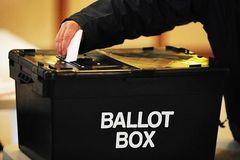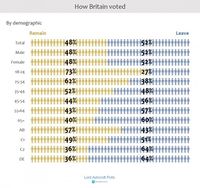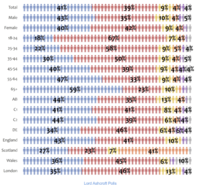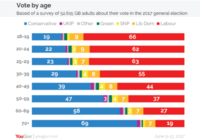Difference between revisions of "UK/General election/2017"
("FOR THE MANY – NOT THE FEW") |
m (Robin moved page UK/2017 General Election to UK/General election/2017) |
||
| (17 intermediate revisions by 2 users not shown) | |||
| Line 1: | Line 1: | ||
{{Event | {{Event | ||
| − | | | + | |wikipedia=https://en.wikipedia.org/wiki/United_Kingdom_general_election,_2017 |
| − | |||
|image=Ballot_Box.jpg | |image=Ballot_Box.jpg | ||
|image_width=240px | |image_width=240px | ||
| − | |image_caption= | + | |image_caption=GE2017: 'June marks end of [[Theresa May|May]]' |
| − | | | + | |occurred=8 June 2017 |
| − | | | + | |constitutes=UK/General Election |
| − | |||
}} | }} | ||
| − | + | Having repeatedly ruled out an early election,<ref>''[https://www.youtube.com/watch?v=WL8skUsptH0 "May's election U-turn: the times she ruled out a snap vote"]''</ref> [[Theresa May]] did a U-turn and announced that the '''UK 2017 General Election''' would take place on 8 June 2017.<ref>''[https://www.theguardian.com/politics/2017/apr/18/theresa-may-uk-general-election-8-june "Theresa May calls UK general election on 8 June"]''</ref> | |
| − | ==Labour's | + | Following the election, which resulted in the [[Conservative Party]] losing its parliamentary majority, Theresa May entered talks with the [[Arlene Foster]]'s DUP, whose 10 seats could allow for the formation of a minority Conservative government.<ref>''[http://www.huffingtonpost.co.uk/entry/general-election-2017-young-people_uk_593e7ba1e4b0c5a35ca115e4 "General Election 2017 Analysis Suggests Young Turnout Wasn’t What Produced Shock Result"]''</ref> |
| + | |||
| + | ==Labour's response== | ||
[[Jeremy Corbyn]] welcomed the announcement: | [[Jeremy Corbyn]] welcomed the announcement: | ||
| − | :"I welcome the Prime Minister's decision to give the British people the chance to vote for a government that will put the interests of the majority first.<ref>''[https://www.youtube.com/watch?v=pi80bJCDl4E "#GE2017: 'June marks end of May'"]''</ref> | + | :"I welcome the Prime Minister's decision to give the British people the chance to vote for a government that will put the interests of the majority first.<ref>''[https://www.youtube.com/watch?v=pi80bJCDl4E "#GE2017: 'June marks end of May'"]''</ref><ref>''[http://www.newstatesman.com/politics/june2017/2017/04/how-labours-power-brokers-will-divide-partys-safe-seats "How Labour's power-brokers will divide up the party's safe seats"]''</ref> |
:"[[Labour Party|Labour]] will be offering the country an effective alternative to a government that has failed to rebuild the economy, delivered falling living standards and damaging cuts to our schools and NHS."<ref>''[http://www.itv.com/news/update/2017-04-18/jeremy-corbyn-welcomes-general-election-decision/ "Jeremy Corbyn welcomes General Election decision"]''</ref> | :"[[Labour Party|Labour]] will be offering the country an effective alternative to a government that has failed to rebuild the economy, delivered falling living standards and damaging cuts to our schools and NHS."<ref>''[http://www.itv.com/news/update/2017-04-18/jeremy-corbyn-welcomes-general-election-decision/ "Jeremy Corbyn welcomes General Election decision"]''</ref> | ||
| Line 21: | Line 21: | ||
==Green electoral pact== | ==Green electoral pact== | ||
| − | On 19 April 2017, [[Caroline Lucas]] and [[Jonathan Bartley]], co-leaders of the [[Green Party]], wrote to to [[Jeremy Corbyn]] and [[Tim Farron]] to urge some form of electoral pact in the upcoming general election, saying this was the only way to “stop the Tories from wrecking our country for generations to come”. They told their Labour and Liberal Democrat counterparts that cooperating could be the route to seeing off an “extreme” form of [[Brexit]] and to help deliver a fairer voting system.<ref>''[https://www.theguardian.com/politics/2017/apr/19/greens-urge-labour-and-lib-dems-to-form-electoral-pact-to-defeat-tories "Greens call for electoral pact with Labour and Lib Dems to defeat Tories"]''</ref> | + | On 19 April 2017, [[Caroline Lucas]] and [[Jonathan Bartley]], co-leaders of the [[Green Party of England and Wales|Green Party]], wrote to to [[Jeremy Corbyn]] and [[Tim Farron]] to urge some form of electoral pact in the upcoming general election, saying this was the only way to “stop the Tories from wrecking our country for generations to come”. They told their Labour and Liberal Democrat counterparts that cooperating could be the route to seeing off an “extreme” form of [[Brexit]] and to help deliver a fairer voting system.<ref>''[https://www.theguardian.com/politics/2017/apr/19/greens-urge-labour-and-lib-dems-to-form-electoral-pact-to-defeat-tories "Greens call for electoral pact with Labour and Lib Dems to defeat Tories"]''</ref> |
| + | |||
| + | ==Theresa May: "lunch snatcher"== | ||
| + | Launching her manifesto in Halifax on 18 May 2017, [[Theresa May]] promised a free school breakfast (between 8 and 9 o'clock) for all primary school children (cost £60 million), whilst withdrawing free school meals at lunchtime for infants aged between 5 and 7 years (cost £650 million).<ref>''[http://www.independent.co.uk/voices/theresa-may-conservative-manifesto-jeremy-corbyn-taxation-winter-fuel-allowance-a7743311.html "Theresa May is right to take school meals off primary school pupils – it's their fault we're in this financial situation anyway"]''</ref> | ||
| + | |||
| + | Theresa May's plan to take away free hot lunches for schoolchildren was labelled a "disgrace" by TV chef [[Jamie Oliver]], who said: | ||
| + | :"It puts our future generations at huge risk by ignoring the proven benefits of a decent lunch."<ref>''[http://www.independent.co.uk/news/health/jamie-oliver-theresa-may-lunch-snatcher-disgrace-free-hot-meals-tory-conservative-manifesto-a7744056.html "Jamie Oliver calls Theresa May's plan to scrap free school lunches a 'disgrace'"]''</ref> | ||
| + | |||
| + | ==GE2017 results== | ||
| + | [[image:GE2017_youth_turnout.png|200px|left|thumb|Youth vote goes Labour]] | ||
| + | [[image:EU_Vote.jpg|200px|right|thumb|[[EU Referendum|EU vote]] gender neutral]] | ||
| + | [[image:GE2017_Turnout.png|200px|right|thumb|[[GE2017]] gender divergence]] | ||
| + | Of the UK's 650 constituencies, the Tories won 318 seats, [[Labour]] 262, [[SNP]] 35, [[Lib Dems]] 12, [[DUP]] 10, [[Sinn Fein]] 7, [[UK Green Party|Green Party]] 1 and others 5.<ref>''[https://www.theguardian.com/politics/ng-interactive/2017/jun/08/live-uk-election-results-in-full-2017 "Election results 2017: seat by seat"]''</ref> After several recounts, the final constituency to declare was Kensington which [[Labour Party|Labour]]'s [[Emma Dent Coad]] won by a margin of 20 votes.<ref>''[http://www.telegraph.co.uk/news/2017/06/09/labour-take-kensington-tories-first-time-since-1974-creation/ "Labour take Kensington from the Tories for first time since 1974 creation of constituency"]''</ref> | ||
| + | |||
| + | Much attention was focused on the propensity of younger people to vote Labour rather than Conservative in the General Election (reproducing their marked preference for ''Remain'' over ''Leave'' in the [[EU Referendum]]). One survey found two thirds of those aged 18 to 24 saying they voted Labour, as did more than half of those aged 25 to 34. Voters aged over 55 broke for the Tories. | ||
| + | |||
| + | ===Gender divergence=== | ||
| + | Lord Ashcroft Polls published detailed analyses of the turnout in both the 23 June 2016 EU Referendum and the 8 June 2017 General Election. | ||
| + | The most glaring statistic revealed between these two votes is that whereas Males and Females voted identically in the EU Referendum (52% Leave and 48% Remain), there was a big gender imbalance in the General Election: | ||
| + | |||
| + | * Men voting 43% Conservative and 35% Labour; and, | ||
| + | |||
| + | * Women voting 40% Conservative and 42% Labour.<ref>''[https://www.facebook.com/patrick.haseldine/posts/10212025413404869 "GE2017 BIG GENDER DIVERGENCE: MEN BLUER & WOMEN REDDER"]''</ref> | ||
| + | |||
| + | Asked unprompted which issues had been the most important in their voting decision, Conservatives were most likely to name [[Brexit]] (as were Liberal Democrats), followed by having the right leadership. Labour voters, meanwhile, were most likely to name the NHS and spending cuts. Only 8% of Labour voters named [[Brexit]] as the most important issue in their decision, compared to 48% of those who voted Conservative.<ref>''[http://lordashcroftpolls.com/2017/06/result-happen-post-vote-survey/ "How did this result happen? My post-vote survey"]''</ref> | ||
{{SMWDocs}} | {{SMWDocs}} | ||
| + | |||
==References== | ==References== | ||
<references/> | <references/> | ||
| − | |||
Latest revision as of 21:04, 16 December 2021
 GE2017: 'June marks end of May' | |
| Date | 8 June 2017 |
|---|---|
Having repeatedly ruled out an early election,[1] Theresa May did a U-turn and announced that the UK 2017 General Election would take place on 8 June 2017.[2]
Following the election, which resulted in the Conservative Party losing its parliamentary majority, Theresa May entered talks with the Arlene Foster's DUP, whose 10 seats could allow for the formation of a minority Conservative government.[3]
Contents
Labour's response
Jeremy Corbyn welcomed the announcement:
- "I welcome the Prime Minister's decision to give the British people the chance to vote for a government that will put the interests of the majority first.[4][5]
- "Labour will be offering the country an effective alternative to a government that has failed to rebuild the economy, delivered falling living standards and damaging cuts to our schools and NHS."[6]
On 16 May 2017, Jeremy Corbyn published the Labour Party manifesto entitled "FOR THE MANY – NOT THE FEW" at a rally in Bradford.[7]
Green electoral pact
On 19 April 2017, Caroline Lucas and Jonathan Bartley, co-leaders of the Green Party, wrote to to Jeremy Corbyn and Tim Farron to urge some form of electoral pact in the upcoming general election, saying this was the only way to “stop the Tories from wrecking our country for generations to come”. They told their Labour and Liberal Democrat counterparts that cooperating could be the route to seeing off an “extreme” form of Brexit and to help deliver a fairer voting system.[8]
Theresa May: "lunch snatcher"
Launching her manifesto in Halifax on 18 May 2017, Theresa May promised a free school breakfast (between 8 and 9 o'clock) for all primary school children (cost £60 million), whilst withdrawing free school meals at lunchtime for infants aged between 5 and 7 years (cost £650 million).[9]
Theresa May's plan to take away free hot lunches for schoolchildren was labelled a "disgrace" by TV chef Jamie Oliver, who said:
- "It puts our future generations at huge risk by ignoring the proven benefits of a decent lunch."[10]
GE2017 results


Of the UK's 650 constituencies, the Tories won 318 seats, Labour 262, SNP 35, Lib Dems 12, DUP 10, Sinn Fein 7, Green Party 1 and others 5.[11] After several recounts, the final constituency to declare was Kensington which Labour's Emma Dent Coad won by a margin of 20 votes.[12]
Much attention was focused on the propensity of younger people to vote Labour rather than Conservative in the General Election (reproducing their marked preference for Remain over Leave in the EU Referendum). One survey found two thirds of those aged 18 to 24 saying they voted Labour, as did more than half of those aged 25 to 34. Voters aged over 55 broke for the Tories.
Gender divergence
Lord Ashcroft Polls published detailed analyses of the turnout in both the 23 June 2016 EU Referendum and the 8 June 2017 General Election. The most glaring statistic revealed between these two votes is that whereas Males and Females voted identically in the EU Referendum (52% Leave and 48% Remain), there was a big gender imbalance in the General Election:
- Men voting 43% Conservative and 35% Labour; and,
- Women voting 40% Conservative and 42% Labour.[13]
Asked unprompted which issues had been the most important in their voting decision, Conservatives were most likely to name Brexit (as were Liberal Democrats), followed by having the right leadership. Labour voters, meanwhile, were most likely to name the NHS and spending cuts. Only 8% of Labour voters named Brexit as the most important issue in their decision, compared to 48% of those who voted Conservative.[14]
Related Documents
| Title | Type | Publication date | Author(s) | Description |
|---|---|---|---|---|
| Document:Did Corbyn leak the Labour GE2017 manifesto | Article | 11 May 2017 | SKWAWKBOX | Did Jeremy Corbyn or another member of Labour's senior leadership team leak the draft manifesto as a political masterstroke? |
| Document:Election 2017: finally, a real choice for Britain's voters | Article | 17 May 2017 | Raoul Martinez | No wonder the billionaire-owned media are attacking Jeremy Corbyn with everything they've got. But we the people can still win. |
| Document:Labour councillor demands refund from party after leaked report exposed sabotage of Corbyn | Article | 16 April 2020 | Lamiat Sabin | Sarah-Jane McDonough's demand for a refund came after Unite General Secretary Len McCluskey claimed that attempts by the "Senior Management Team" to sabotage Labour’s chances in the UK/2017 General Election could have broken electoral law. |
| Document:Labour: The Way Ahead | article | 31 July 2016 | Paul Mason | If Jeremy Corbyn wins on 24 September 2016, we should say to his opponents inside the Parliamentary Labour Party: end the passive resistance. We have something that neither Brown nor Miliband ever had, and which Blairism lost ten years ago. A story that makes sense, a strategy that can win, an unprecedented mass membership; and a leader who, in the face of intense pressure, gets stronger. |
References
- ↑ "May's election U-turn: the times she ruled out a snap vote"
- ↑ "Theresa May calls UK general election on 8 June"
- ↑ "General Election 2017 Analysis Suggests Young Turnout Wasn’t What Produced Shock Result"
- ↑ "#GE2017: 'June marks end of May'"
- ↑ "How Labour's power-brokers will divide up the party's safe seats"
- ↑ "Jeremy Corbyn welcomes General Election decision"
- ↑ "FOR THE MANY – NOT THE FEW"
- ↑ "Greens call for electoral pact with Labour and Lib Dems to defeat Tories"
- ↑ "Theresa May is right to take school meals off primary school pupils – it's their fault we're in this financial situation anyway"
- ↑ "Jamie Oliver calls Theresa May's plan to scrap free school lunches a 'disgrace'"
- ↑ "Election results 2017: seat by seat"
- ↑ "Labour take Kensington from the Tories for first time since 1974 creation of constituency"
- ↑ "GE2017 BIG GENDER DIVERGENCE: MEN BLUER & WOMEN REDDER"
- ↑ "How did this result happen? My post-vote survey"
